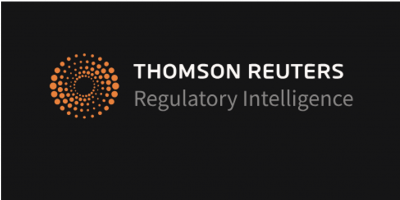Thomson Reuters interview Robert Baugh, our CEO
Thomson Reuters Regulatory Intelligence interviewed Robert Baugh, our founder & CEO, as part of their annual series 'The Big Question', where Reuters speak to important figures in the compliance and financial arena to hear their thoughts and discuss wider issues related to their fields

THE BIG QUESTION: Robert Baugh, CEO, Keepabl
TRRI news
Published 28-Dec-2023 by Anne Kilminster, Regulatory Intelligence
This article was first published in Thomson Reuters Regulatory Intelligence and is the personal view of the author, Robert Baugh. Subscribers link. Free trial link.
Regulatory Intelligence speaks to important figures in the compliance and financial arena to hear their thoughts and discuss wider issues related to their fields. Today we talk to Robert Baugh, chief executive of Keepabl.
An English-qualified solicitor since 1995, Robert’s career (to date) splits into three nearly equal parts: private practice IP and technology lawyer in London, Hong Kong and Melbourne, then general counsel of VC-backed growth tech companies, then founder and chief executive of Keepabl, an award-winning privacy management software company, based in London.
What is a typical workday like for you?
One of the joys of being in a growth company is the variety of your days, but there are three common themes. One focus is speaking with customers and partners to continually improve our SaaS solution to deliver the best value to our customers — we are insanely customer-focussed and I enjoy being involved in product.
Another is to grow the business through the right opportunities. And the third is ensuring Keepabl has the relevant resources to take advantage of those opportunities and deliver that value to customers.
Which part of your job gives you the most satisfaction?
Our “start with the why” is to joyfully use tech to solve people’s headaches and make them feel happier. I love solving problems for people in a joyful, creative way and seeing the team take that culture on board continues to be satisfying. It’s an added joy when I see that come to life in interactions between customers and our team.
What part of your job gives you the most frustration?
I believe most founders start businesses to solve problems and to see the happiness result in customers, so I’d have to say what I find most frustrating is any time spent away from that focus.
What are the most significant forthcoming developments in financial services that you are concerned about, or do you think the profession/industry should be concerned with?
We’re clearly at the start of the age of AI and, as a society, we’re in the phase of eager implementation coupled with a disparate approach to regulation across the globe. AI regulation itself isn’t a concern — I can’t see any likely regulation stopping the massive and beneficial use of AI.
My concern is that organisations’ desire to rapidly implement AI and their readiness to believe in its ability in any area (for example, scoring and emotion recognition) might lead them on occasion to overlook core due diligence and the regulations we already have in place to avoid discrimination and inequality of outcome.
Which international regulatory development causes you the most concern?
Given the pace of change in technology, the resulting volume and velocity of new regulations from all areas is a concern.
For example, the EU’s data package is voluminous and I’ve heard more than one leading City lawyer say that they had taken weeks to gain just a basic understanding of the Data Act alone. And in the UK, Ofcom’s first guidance on the new Online Safety Act was more than 1,500 pages long.
While these regulations are all valid, the sheer volume and velocity hitting compliance practitioners generate more uncertainty and risk of non-compliance until the rules and definitions are fully clarified, which I believe will take a few years.
With the new regulatory arenas being created around the world, however, it could also be said that it’s the most exciting time to be working in compliance.
Has the increased focus on ESG changed the way you work? And if so, how?
We’ve always had ESG close to heart. For example, privacy is a core component of governance in particular, but affects each area. We have various initiatives we group together in our membership of the Pledge 1% movement, from flexibility and support for staff initiatives to supporting charities with reduced subscriptions to planting a tree per month per customer.
Has the pandemic changed the field of compliance and risk? How has it affected your work?
Lockdown massively changed the market and accelerated the adoption of regtech, including Keepabl. Remote working made people look at the tools they were using and at the risks facing their organisations, sometimes for the first time in a few years. SaaS solutions are perfect here, with inbuilt security features such as MFA, SSO and auditability, as well as native collaboration and reporting.
How are things changing in your world with the proliferation of regtech companies and products?
It’s great to see the maturing of the market in privacy compliance software. Before lockdown, to use a kitchen analogy (we have a free YouTube channel called Privacy Kitchen), people typically asked for something that boiled water, roasted a chicken, made toast, froze water and that they could plug in and forget.
Privacy is a way behind but is rapidly catching up with security in terms of an understanding of the issues first, then the right solutions and that one will need an in-house champion to select and manage the correct suite of solutions, usually with the help of an external expert.
What are your thoughts on crypto — do we need more regulation in this area?
It’s an interesting question — just as with AI, there’s already a lot of regulation that applies to crypto and perhaps we need a clearer understanding of their application first. I’m surprised sometimes that some of the marketing claims get through, for example.
What pearl of wisdom would you give to a budding compliance officer?
Don’t panic, don’t take it personally and focus on continual learning to build out your areas of competence.
What has been your greatest professional achievement?
A private (until now) highpoint was when, as general counsel of one organisation, I found an innovative way to resolve a difficult technical issue that was preventing us from listing. All our professional advisors had drawn a blank and unlocking the issue released great value for the organisation and, importantly, my colleagues.
What do you do to relax?
Playing any sort of game with my children.
Can you recommend a restaurant to us?
Brindisa in Borough Market is a long-time favourite.
(Anne Kilminster, Regulatory Intelligence)
Copyright © 2023 Thomson Reuters. All rights reserved.
Related Articles

Blog
What now for DPDI given snap election?
What happens to DPDI 2 now that Prime Minister Sunak, on 22 May 2024, called a snap general election for 4 July 2024? Let’s look at DPDI 2’s path through Parliament,…

Blog News & Awards
UK Consultation on Data Protection Reforms 2021
On 10 September 2021, the UK’s Department for Digital, Culture, Media & Sport (DCMS) launched Data: a new direction, a consultation seeking responses on a wide range of proposed changes…

